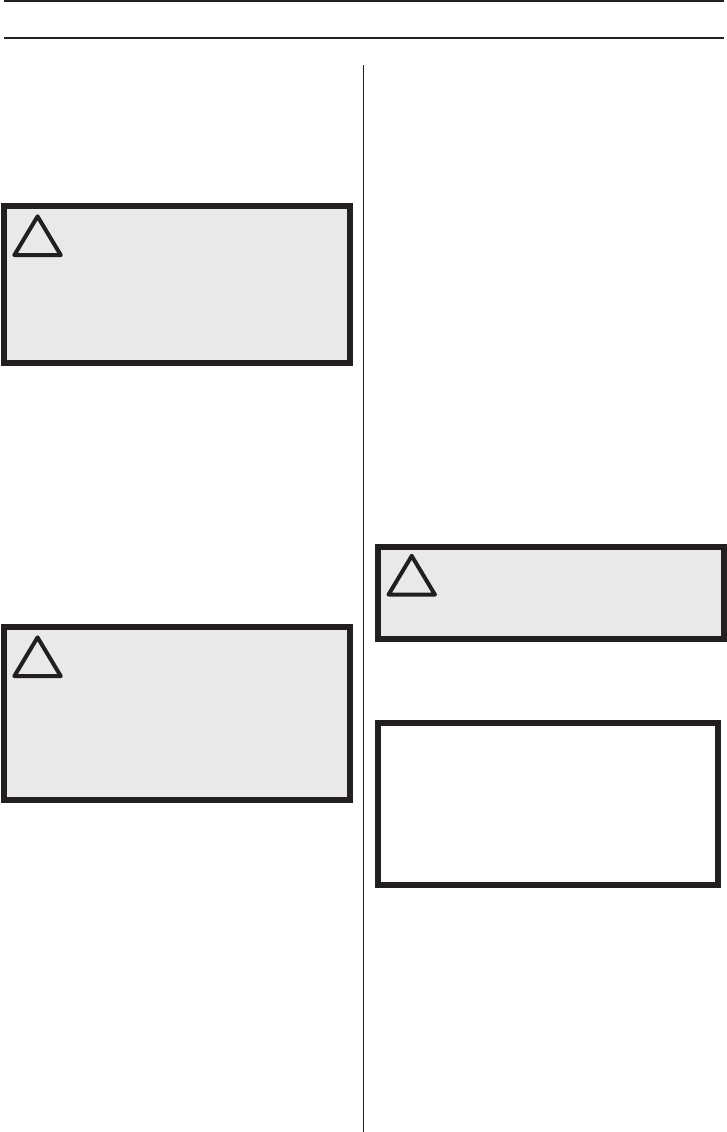
WORKING TECHNIQUES / MAINTENANCE
English – 19
1153140-26 Rev. 2 2010-02-11
If you must cut across tree/limb, make two to three cuts,
one inch apart, one to two inches deep.
Continue to cut deeper until tree/limb bends and tension is
released.
Cut tree/limb from outside the bend, after tension has been
released.
How to avoid kickback
What is kickback?
The word kickback is used to describe the sudden reaction
that causes the chain saw and bar to jump off an object
when the upper quadrant of the tip of the bar, known as the
kickback zone, touches an object. (44)
Kickback always occurs in the cutting plane of the bar.
Normally the chain saw and bar are thrown backwards and
upwards towards the user. However, the chain saw may
move in a different direction depending on the way it was
being used when the kickback zone of the bar touched the
object.
Kickback only occurs if the kickback zone of the bar
touches an object. (45)
Limbing
Make sure that you can stand and move about safely. Work
on the left side of the trunk. Work as close as possible to
the chain saw for maximum control. If possible, let the
weight of the chain saw rest on the trunk.
Keep the trunk between you and the chain saw as you
move along the trunk.
Cutting the trunk into logs
See instructions under the heading Basic cutting
technique.
General
The user must only carry out the maintenance and service
work described in this Operator’s Manual. More extensive
work must be carried out by an authorised service
workshop.
Carburettor adjustment
Your Husqvarna product has been designed and
manufactured to specifications that reduce harmful
emissions.
Function
• The carburettor governs the engine’s speed via the
throttle control. Air and fuel are mixed in the carburettor.
The air/fuel mixture is adjustable. Correct adjustment is
essential to get the best performance from the machine.
• The T-screw regulates the throttle setting at idle speed.
If the T-screw is turned clockwise this gives a higher idle
speed; turning it anti-clockwise gives a lower idle speed.
Basic settings and running in
The basic carburettor settings are adjusted during testing
at the factory. Fine adjustment should be carried out by a
skilled technician.
Rec. idle speed: See the Technical data section.
Fine adjustment of the idle speed T
Adjust the idle speed with the T-screw. If it is necessary to
re-adjust, turn the T-screw clockwise while the engine is
running, until the chain starts to rotate. Then turn anti-
clockwise until the chain stops. When the idle speed is
correctly adjusted the engine should run smoothly in every
position and the engine speed should be safely below the
speed at which the chain starts to rotate.
Checking, maintaining and
servicing chain saw safety
equipment
Chain brake and front hand guard
Checking brake band wear
Brush off any wood dust, resin and dirt from the chain
brake and clutch drum. Dirt and wear can impair operation
of the brake. (46)
Regularly check that the brake band is at least 0.6 mm
thick at its thinnest point.
Checking the front hand guard
Make sure the front hand guard is not damaged and that
there are no visible defects such as cracks.
!
WARNING! Kickback can happen very
suddenly and violently; kicking the chain
saw, bar and chain back at the user. If
this happens when the chain is moving it
can cause very serious, even fatal
injuries. It is vital you understand what
causes kickback and that you can avoid
it by taking care and using the right
working technique.
!
WARNING! A majority of kickback
accidents occur during limbing. Do not
use the kickback zone of the guide bar.
Be extremely cautious and avoid
contacting the log, other limbs or
objects with the nose of the guide bar.
Be extremely cautious of limbs under
tension. They can spring back toward
you and cause loss of control resulting
in injury.
!
WARNING! Contact your servicing
dealer, if the idle speed setting cannot be
adjusted so that the chain stops. Do not
use the chain saw until it has been
properly adjusted or repaired.
Note! All service and repair work on the machine
demands special training. This is especially true of the
machine’s safety equipment. If your machine fails any
of the checks described below we recommend that you
take it to your service workshop. Any maintenance
other than that described in this manual must be
carried out by your servicing dealer (retailer).
Switch off the engine and take off the ignition cable
before repairs or maintenance


















